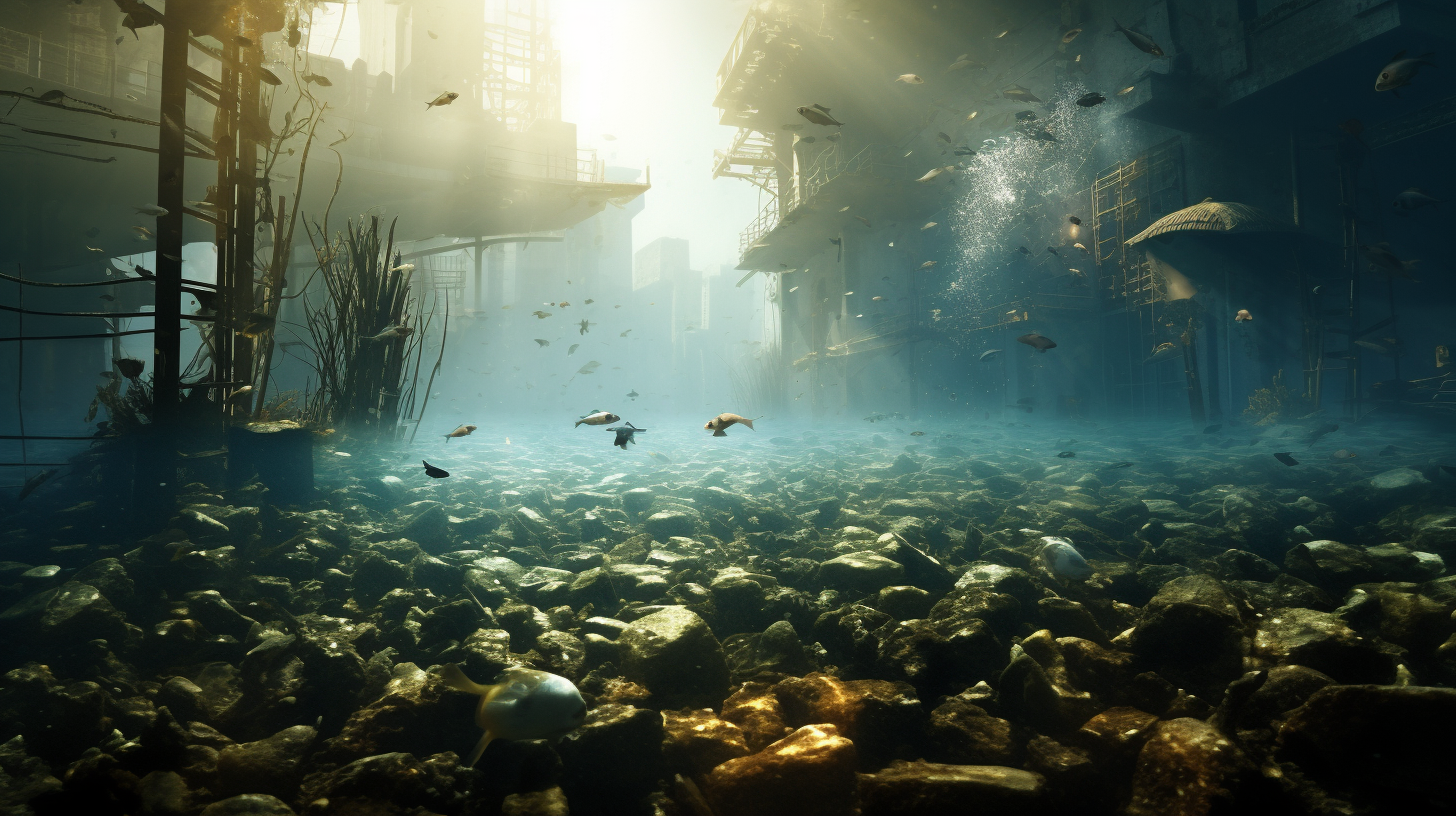In a world where the relentless rise of sea levels has irrevocably altered the shape of our continents, humanity has been pushed to the brink of an unimaginable transformation. With land becoming an ever-scarcer commodity, humankind has forged a new existence on the water – Cities Beneath the Tides are now cradles of civilization interwoven within the fabric of the ocean’s embrace.
These aquatic human settlements are not the picturesque, utopian havens that seafaring romantics once dreamed of. They are the gritty, resilient responses to an unforgiving world that has seen the high tide lines redrawn, leaving former metropolises to sleep with the fishes. In this new aquatic epoch, skyscrapers are reefs, highways are waterways, and the hum of urban sprawl is replaced with the ebb and flow of the tide.
‘Aquapolis’, as some have taken to calling these settlements, are marvels of despair and ingenuity. In place of traditional foundations, massive floating platforms boast soilless gardens and hydroponic farms, with algae-based food production becoming a delicacy for a world starved of its green expanses. Architectural aesthetics have given way to practical designs that withstand the tidal surges and storms that are all too common in this age of climate unpredictability.
Inevitably, these undersea towns have birthed a new culture. Children learn to swim before they walk, their first lullabies harmonizing with the sounds of the ocean. The remnants of coastal cities, now eerie underwater museums, are playgrounds for the adventurous. Traditions are interwoven with necessity, such as the highly anticipated Harvest Floats, whereby communities gather to trade goods that cannot be grown or crafted in their davit-dangling dwellings.
Notably, the pioneering spirit exhibited in these watery hamlets strikes a stark contrast to the submerged sorrow that lingers beneath. Sociologists speculate on the psychological toll of such a drastic shift in living conditions – that perhaps living continuously on the brink fosters a sense of collective, harsh resilience rather than a fear of the abyss.
Resilience doesn’t preclude grief, however, as the Sight of Silence commemorations showcase; these rituals involve floating candles lit to acknowledge the lost landmarks and legacies of ancient, now-submerged cities. Yet amidst the melancholy reflection, necessity has spawned innovation. Enterprising minds have designed water-turbine energy systems using the natural flow of currents and wave force, marking a relentless search for silver linings.
There are still stories of beauty to tell among these waterlogged worlds. The Floating Festivals capture the indomitable human spirit that refuses to be drowned out, featuring art installations that commandeer the surface tension with their vibrancy. Musicians utilize the acoustics of water to send soul-stirring sounds through the fluid avenues of their aquatic abodes.
In confluence with our previous work on the ‘Aqueous Archipelago’, where Maria Gonçalves brought innovations like aqua-agriculture and sustainable transportation to the forefront, the rise of these aquatic settlements represents a leap into an era where adaptation means survival. As a species, we have traversed the spectrum from environmental violators to victims, and now to reluctant beneficiaries of our watery world.
As we bear witness to the opalescence of a cityscape refracted through brackish waters, it is difficult not to ponder, both in awe and in sorrow, the troughs and crests of human tenacity and the deep-sea scars of our ecological transgressions. In this dystopia, we are treading water in both a literal and metaphorical flood, striving to stay afloat in a sea of our own making.
To illustrate the urgency of adapting to the waterlogged reality we now inhabit. There is no blueprint for what comes next, but rest assured, as long as the waters rise, so too will the resilience and resourcefulness of humankind, bobbing up like a buoy to the challenges that engulf us.
